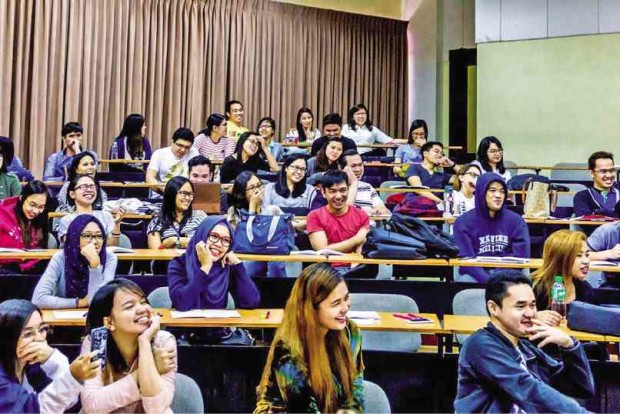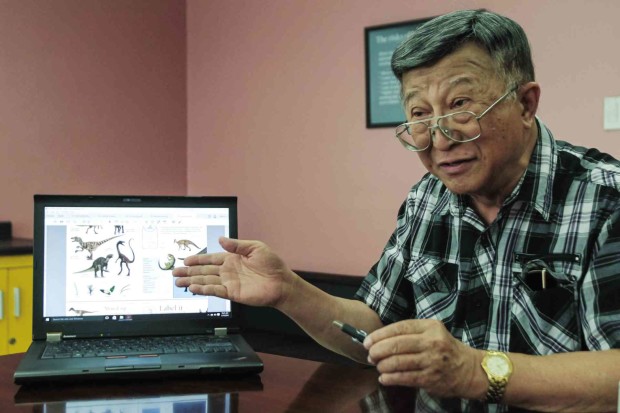Learning requires both old and new skills

PARTICIPANTS at a MAP seminar in Xavier University in Cagayan de Oro City laugh at one of the jokes Cebedo incorporates in his talk.
Teachers should use technology to make their classes more interesting, entertaining and interactive while students need some old-school learning skills to optimize the benefits of their education.
This, in effect, is the message that Perri Cebedo has been trying to spread to Filipino teachers, students and parents for several years now through his Maximizing Academic Performance (MAP) program.
Cebedo, a former Ateneo Grade School (AGS) teacher, said Philippine education could not be improved unless students were taught how to learn. “It has been found that [learning] is not a question of IQ or school or home environment but whether or not a student has learned the smarts and skills to study more in less time with higher knowledge retention.”
Cebedo noted that many Filipino students were passive. “They do not want to talk or participate in class,” he said. They did not even want eye contact. Children had to be pulled out of that passive learning style and coaxed out of their shells.
Although students had access to the Internet, they did not really know the value of materials there. And they could not rely on their mentors for guidance because teachers were less technology savvy, Cebedo said. Teachers did not even know how to use PowerPoint.
Start with teachers
For students, technology “can be a big distraction especially if you don’t know to use it,” Cebedo said. “Technology should start with teachers; they should be taught how to use PowerPoint and other presentation applications. Teachers should use technology in a manner that is interactive, entertaining, not boring.”
Cebedo said teachers should not use materials without explaining. A teacher should remain a teacher.
Materials introduced should be related to the lesson, Cebedo said as he noted that children did not like reading textbooks if they did not know why they were reading them.
In his seminars, Cebedo encouraged teachers to improve their presentation skills and to conduct interactive, participative sessions.
“Teachers should let students discover the joy of learning. They should not just fill students’ heads with lots of information but should ignite their passion for learning and fire up their imagination,” he said.
Cebedo said MAP, though it could be used for the grade level, was most appropriate for junior and senior high school students, teachers and parents.
Cebedo’s four-hour MAP session covered 10 main points:
1. The learning environment at home and school; effective classroom participation
2. Attitudes and characteristics of champion learners
3. Preparing for tests, taking tests, how to ace your tests
4. The weekly study plan, an application of time management
5. How to study boring textbooks: the SQ4R method (SQ4R stands for survey, question, recite, record, ’rite and review)
6. How to take lecture notes using the Cornell method
7. How to sharpen memory skills, 8 tools for remembering
8. How to build a powerful vocabulary to reignite the joy of learning
9. Using video tutorials/multimedia for repeatable lectures to enhance learning
10. Using e-books and illustrated encyclopedias to expand and deepen learning
To optimize the benefits of these skills, Cebedo advised students to minimize DI (distraction and interaction) at home, maximize FOCC (focus and concentration) and practice chunking—dividing study time into chunks of 15 or 20 minutes. He explained that the brain could usually remember only beginnings and ends “so more beginnings and endings will help the brain remember and more things will be retained.”
As for note-taking, he said students would know what was important when the teacher gave a preview and summary of lessons, enumerated things using his/her fingers, wrote on the board or made a dramatic gesture.
He advised students where they should study, after finding out that their favorite place was the bedroom. “The bedroom is a dangerous place to study because it will make it easy to fall asleep,” he said.
No multitasking
Cebedo also stressed that there was no such thing as multitasking. Students could not study effectively if they had to check their cellular phone often, had music blaring or watched people pass by.
The California-based Cebedo said he developed MAP initially to help his children do well in American schools when they moved to the United States in the 1980s. “I worried that my children would not be able to cope with the American system … so I bought books on how to develop skills that would help them cope with college education in the US,” he said.
When he traveled to Latin America to conduct human resource and marketing seminars for Syntex Corp., he offered MAP as a bonus to sweeten the pot for prospective clients, realizing it could be used not just by his own children but also the families of doctors and medical reps.
MAP complemented the program for doctors, Cebedo said. “Doctors were very choosy. They would not just buy anything …. The program for children helped sell Syntex products.”
In the end, Cebedo said even the doctors told him MAP would have helped them in college.
Cebedo said he thought he needed to influence teachers because they had a stake in children’s learning. “They could motivate children but I found out that teachers had so many things to do.”
Cebedo said the Philippines’ very slow Internet service made it difficult to optimize the use of online resources, so he put materials in flash drives that teachers could use if they could not connect to the Internet.
But, apart from unreliable power supply in many parts of the country, Cebedo said he found out that because of the many things teachers were asked to do, many of them did not have the opportunity to open the flash drives.
He also had very little interaction with public school teachers, except for the few who took the initiative to attend his sessions.
Cebedo said he was frustrated at not being able to reach any high-ranking official of the Department of Education to arrange seminars. He said public school teachers were not allowed to attend seminars on weekdays and were only available on Saturdays.
Cebedo, who with his wife Monina, also a former AGS teacher, visited around 12 schools this year, did manage to address some 170 public school teachers in Batangas organized by a former MAP seminar participant and with the blessing of the provincial DepEd office.
Cebedo said former seminar participants told him the skills they learned enabled them to pull kids out of their passive learning style and to participate more actively in class.
Cebedo said his workshops were free although some school hosts charged a minimal fee just to give participants the feeling they had invested in the activity.
For the Xavier University-Ateneo de Cagayan, whatever amount was raised from the fees went into the school’s medical education scholarship fund.
All other expenses—airfare, hotel—he shouldered himself, Cebedo said.
But he sold the fully loaded 8-gigabyte flash drives or USB for P200, less than half of what an empty unit would cost, just so people would use them knowing they paid for them.
The USB could be lent to students with laptops or personal computers, he said. Each drive was loaded with hundreds of video tutorials on different subjects.
Cebedo said he even had vocabularies for different levels, subjects, professions and English proficiency tests.
Cebedo, who had been nominated for the annual CNN Hero of the Year first won by Filipino kariton classroom champion Efren Peñaflorida, said he wanted to work with top schools that would be asked to nominate about 10 top students in each class from Grade 8. He would give the seminar for free but would expect participants to mentor their peers who needed help.
He said he totally agreed with the Learning section’s search for outstanding teacher that encouraged students to nominate.
“If they (students) have not learned, you have not taught,” he said.
When asked if his system worked with his own kin, Cebedo proudly announced that his children and grandchildren graduated with honors. The older grandchildren were even teaching the younger ones to use grandpa’s MAP system.
Cebedo said those interested in his seminar could e-mail him at [email protected]. Tutorials and other educational materials are available on his Facebook page.















